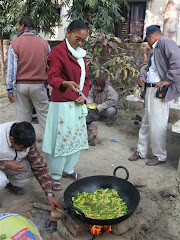The monsoon lingers on, with torrential downpours and increasing temperatures. David uses clothes pegs as cycle clips in an attempt to escape the worst of the mud on his way to Bokhari, but he ends up wheeling his bike through deep mud for the last part of the journey, then washing his legs and feet at the community pump before going to class. He is usually the first to arrive; the metal plate is banged for the start of school, often before any teachers arrive. He has yet to work out when lessons are supposed to start and end. The timetable shows 7 periods, but there has never been a period 4, and the students are usually sent home before period 7. He has seen some good teaching, and the teachers are quick to respond positively to his suggestions.
Headteacher training started on Sunday at the ETC when 11 of the expected 25 participants arrived. There were three more on Monday, so the ‘house captain’ and the ‘day briefer’ were appointed. After the introduction and making of name labels (this took a long time) everyone appeared to go to sleep, until I realised that it was a visualisation exercise, creating their ‘vision’ for their school. A good start. There were some activities on leadership during the morning, although role playing different leadership styles would have been more fun than reading out information from a chart. The house captain announced we were over time and they needed a break. The afternoon session consisted of some tedious but occasionally amusing powerpoint presentations, disrupted by the noise of the rain, powercuts and water pouring through the ceiling making the computer fizz alarmingly. Some of the powerpoints were in English, which none of the participants speak, and I was required to explain things at various points to Durga so he could translate them into Nepali. When all this became too much, I retreated into my new place of work – the ‘library’. At the moment, there is me, the brown dog, and an empty bookcase.
On Wednesday, it was my turn to present a session on action research. Fortunately I had already discovered that only one person understood English, and they were unlikely to have heard of action research, so I had been able to plan my material appropriately. After a brief explanation in bad Nepali, supported by key words on powerpoint (just to show I know how to use it – but the electricity was fluctuating wildly so it kept going off) we did some simple pair and group activities; I can manage imperatives. They loved a sequencing activity I gave them to do, and wanted to take my cards home, so of course I let them. I have plenty of time to make new ones. They also came up with some brilliant ideas of things they wanted to try out in their own schools, and examples of some things they have done without knowing that they were action research. A good morning, ending with celebratory tea and samosas at the tea ‘shed’ on the corner.
We were summoned to UNICEF on Thursday by the formidable Radhika who will be ‘promoted’ to Nepalgunj (hotter than Biratnagar and the centre of much unpleasant political activity) at the end of the month. She has many tasks to complete before she leaves, and needs help to get things done! Suman, the research director arrived from Kathmandu, keen to use action research as a monitoring tool, and we found ourselves delivering a session as part of a planning meeting for developing new systems of monitoring and evaluation. We have been drawn into a number of training activities, which could be very useful to help us work proactively with our colleagues and achieve some of the VSO objectives. On Friday, Radhika planned to take us to one of the ‘child friendly schools’ UNICEF has developed in Biratnagar. She telephoned just after I had arrived at work and set up the day’s training, so I pedalled home, collected David and we cycled down the hot highway. When we arrived, the white landcruiser was waiting and with some embarrassment we climbed into the airconditioned interior. After speeding towards the Indian border for a few kilometres, we turned off onto a dirt track and set off into the countryside. The track eventually became a swamp, and the landcruiser would go no further. As UNICEF workers do not walk, we returned to UNICEF, home and office in time for the second training session. Umapati had spent the day using the new speedy internet connection, showing everyone who came in the location of their home on Google maps. At the end of the day, over the usual glasses of tea, I treated my colleagues to a virtual tour of Bradford-on-Avon, so they now know something about Saxon churches, tithe barns, weavers, canals, aqueducts ……
Friday was Teej, a women’s festival, so most of the primary schools were closed. After a day of eating on Thursday, Friday was a fasting day where they pray for a long life and prosperity for their husbands. Radhika says they also spend a lot of time cursing their mothers-in-law, with whom many are forced to live. All the temples were packed with women in splendid red and gold saris doing puja, singing and dancing.
Many messages this week wishing us a happy millennium from friends in Ethiopia. The new millennium dawned there on Wednesday. Several of our volunteer friends had gone back to Addis for the celebrations and I managed to watch them on the internet.
.jpg)
.jpg)







.jpg)
.jpg)
.jpg)
















.jpg)



















